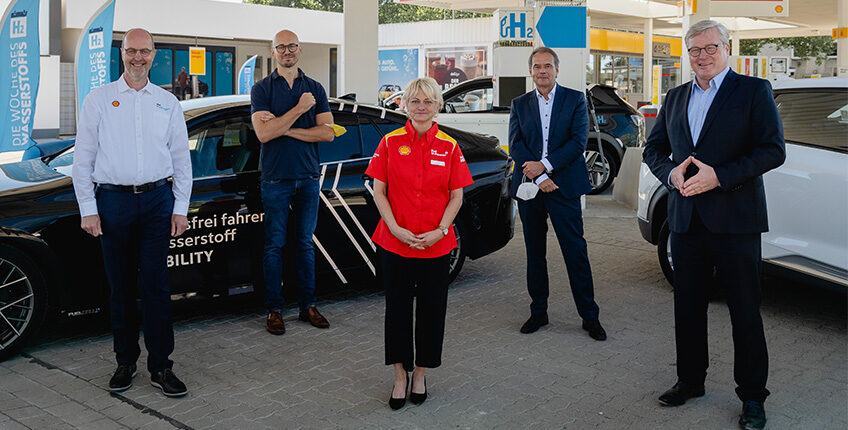Braunschweig 14.6.2021 – While various large-scale projects for the production of green hydrogen (H2) are in the starting blocks in Germany, the hydrogen application side is also growing continuously. The nationwide network of hydrogen filling stations for cars with fuel cells now consists of 91 stations.
The WEEK OF HYDROGEN NORTH 2021, which is supported by the five northern German states, aims to communicate hydrogen in all sectors in a clear and highly vivid manner. The topic of hydrogen mobility can be driven home – in the truest sense of the word – at an H2 filling station, such as the one at the Shell station in Braunschweig.
Dr. Bernd Althusmann, Minister of Economic Affairs, Labour, Transport and Digitalisation of the State of Lower Saxony, said at a press briefing: “Lower Saxony offers the right environment for the development of a comprehensive hydrogen economy. We need to exploit the outstanding potential of this molecule much more extensively and tap into this potential step by step. Our state can become a role model and technology leader on the way to carbon-neutral mobility and a sustainable economy, without losing sight of Lower Saxony’s role as an industrial location. This also involves without question the possibilities that hydrogen opens up in the transport sector. For road-based hydrogen mobility, a good network of filling stations is a key milestone.”
The Lord Mayor of Braunschweig, Ulrich Markurth, emphasised: “As a mobility region and as one of the most research-intensive regions in Europe, we have numerous interesting research approaches and projects here on the topic of hydrogen and mobility. With regional activities and networks, we are endeavouring to connect the existing activities and stakeholders even better in order to create synergies for research and development. The hydrogen filling station is an important building block for this, as it is seen as the central infrastructure. Hydrogen as an energy medium is a technology of the future, also with regard to mobility. It enables the storage of electrical energy, in large quantities and over long periods of time. Its use is particularly promising in areas where electrification is not feasible. This applies to heavy goods vehicles, shipping and air traffic, as well as special industrial processes such as the production of steel.”
The hydrogen filling station network in Germany is becoming increasingly dense. Six H2 filling stations are already in operation in Lower Saxony, including Braunschweig, Hanover, Laatzen, Wolfsburg, Osnabrück and Stuhr. Another station is currently under construction in Oldenburg.
Over the next few months, H2 MOBILITY Germany will have achieved its first expansion target of 100 hydrogen stations. Passenger cars and light commercial vehicles (e.g. vans) can be refuelled with hydrogen at all H2 filling stations. Buses can also be refuelled at nine locations. From 2021 onwards, further stations will be built where demand for commercial vehicles is expected in the short term and where a public H2 filling station would make good sense for a growing network of filling stations.
The Braunschweig facility was already commissioned in November 2020 by H2 MOBILITY Deutschland together with its partners Shell and Air Liquide and has a capacity of around 200 kilograms of hydrogen. That is enough to refuel 50 vehicles a day. In its first six months, it has already refuelled more than half a tonne of hydrogen. That corresponds to around 50,000 kilometres of CO2-free driving.
For the construction of the hydrogen station in Braunschweig, H2 MOBILITY received funding from the National Innovation Programme Hydrogen and Fuel Cell Technology (NIP) through the Federal Ministry of Transport and Digital Infrastructure (BMVI – Bundesministerium für Verkehr und digitale Infrastruktur).
About H2 MOBILITY
H2 MOBILITY Deutschland GmbH & Co. KG is responsible for the nationwide development of a hydrogen infrastructure in Germany. The initial goal is to operate 100 hydrogen filling stations in seven German metropolitan areas (Hamburg, Berlin, Rhine-Ruhr, Frankfurt, Nuremberg, Stuttgart and Munich) and along the connecting trunk roads and motorways.
From 2021 onwards, further stations will be constructed where there is demand for commercial vehicles and where a public filling station is practical for a growing network of filling stations for passenger cars. H2 MOBILITY will take on all tasks – planning, construction, operation and marketing – that are necessary for the successful expansion and operation of the network.
The partners of H2 MOBILITY are Air Liquide, Daimler, Linde, OMV, Shell and TOTAL. BMW, Honda, Hyundai, Toyota and Volkswagen as well as NOW GmbH National Organisation Hydrogen and Fuel Cell Technology advise H2 MOBILITY as associated partners.
More information: www.h2-mobility.de


